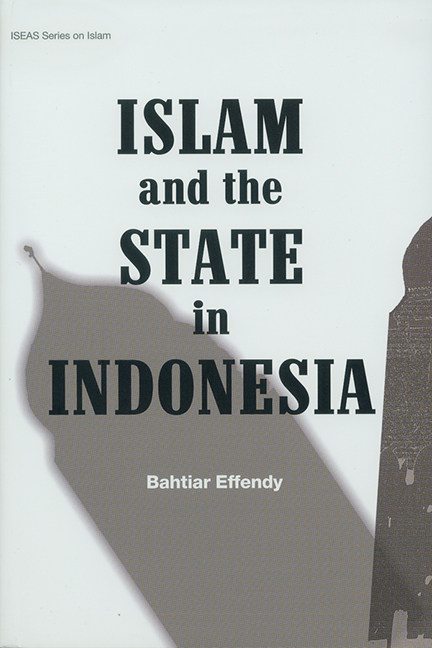Book contents
- Frontmatter
- Dedication
- Contents
- Abbreviations
- Acknowledgements
- Chapter 1 Introduction: The Problem of Political Relationship between Islam and the State
- Chapter 2 Explaining the Uneasy Relationship: Political Antagonism between Islam and the State in Indonesia
- Chapter 3 Emergence of the New Islamic Intellectualism: Three Schools of Thought
- Chapter 4 Implications of the New Islamic Intellectualism: Ideas and Practices
- Chapter 5 Beyond Parties and Parliament: Reassessing the Political Approach of Islam
- Chapter 6 Reducing Hostility: The Accommodative Responses of the State
- Chapter 7 Conclusion: Towards an Integrated Political Relationship between Islam and the State
- Chapter 8 Political Islam in Post-Soeharto Indonesia: A Postscript
- Bibliography
- Index
- About the Author
Chapter 4 - Implications of the New Islamic Intellectualism: Ideas and Practices
Published online by Cambridge University Press: 21 October 2015
- Frontmatter
- Dedication
- Contents
- Abbreviations
- Acknowledgements
- Chapter 1 Introduction: The Problem of Political Relationship between Islam and the State
- Chapter 2 Explaining the Uneasy Relationship: Political Antagonism between Islam and the State in Indonesia
- Chapter 3 Emergence of the New Islamic Intellectualism: Three Schools of Thought
- Chapter 4 Implications of the New Islamic Intellectualism: Ideas and Practices
- Chapter 5 Beyond Parties and Parliament: Reassessing the Political Approach of Islam
- Chapter 6 Reducing Hostility: The Accommodative Responses of the State
- Chapter 7 Conclusion: Towards an Integrated Political Relationship between Islam and the State
- Chapter 8 Political Islam in Post-Soeharto Indonesia: A Postscript
- Bibliography
- Index
- About the Author
Summary
Now is the time to conduct a rational and functional politics, in the sense of managing [Indonesia's] common concern, namely: welfare, justice, and democracy. This new political discourse must be developed within Muslim community. A new [mode of] politics, which takes sociological changes into account, must be initiated. Without this, there will be a gap between institution and social base. Indonesia is no longer a field for elite political alliance. To begin a new political tradition is not an easy task. There will always be forces which try to reintroduce the old political bases.
KuntowijoyoIn chapter 3 I described at length the general pronouncements of the new Islamic intellectualism. To better understand the nature of this intellectual movement, I examined the case in the light of its socio-political context. Wherever necessary, I also discussed — albeit briefly — the social origins of its key actors and precursors, particularly concerning their intellectual background. And finally, I also attempted to throw some light on — but did not fully illuminate — the kind of impact the new intellectualism has on the contemporary expression of Islamic political ideas and practices.
This and the following chapters address the latter issue more fully. Based on the variety of the intellectual preferences described above, I will explore the implications of the new intellectualism on the current expression of Indonesia's Islamic political thoughts and actions under three major themes: (1) reformulation of the theological or philosophical underpinning of political Islam; (2) redefinition of the political objectives of Islam; and (3) reassessment of the political approach of Islam. The first two of these themes will be treated in this chapter, while the third is given a chapter of its own. In my view, as will be demonstrated in the following discussion, it is in terms of these three interlocking themes that the significance of the intellectual transformation of Islamic political ideas and practices in today's Indonesian political Islam must be understood.
REFORMULATING THE THEOLOGICAL UNDERPINNING OF POLITICAL ISLAM
Recalling our earlier discussion in chapter 2, I suggested that the chief, though not the only, problem which had inhibited a viable synthesis between Islam and the state was the difficulty of finding a nationally acceptable linkage between them.
- Type
- Chapter
- Information
- Islam and the State in Indonesia , pp. 102 - 123Publisher: ISEAS–Yusof Ishak InstitutePrint publication year: 2003



